PHOTO
The Basel Committee on Banking Supervision, charged with worldwide oversight, said Thursday that it would "learn lessons" from the US bank failures and the emergency buyout of Credit Suisse that have roiled financial markets.
The near-implosion of Credit Suisse last week, leading to its sale to fellow Swiss giant UBS, came after the collapse of two tech-lending banks in the United States triggered fears of international fallout.
The Basel committee, established in 1974, said after a meeting that it would "take stock of the regulatory and supervisory implications stemming from recent events, with a view to learn lessons".
"Banks and supervisors must therefore be vigilant to the evolving outlook to ensure that the global banking system is resilient," the watchdog said.
The committee also noted the high inflation and feeble growth in many countries, as well as geopolitical tensions, were posing "risk-management challenges to banks".
"Recent events have further highlighted the importance of a resilient global banking system underpinned by effective bank governance and risk-management practices, robust regulatory standards, and strong supervision supported by proactive cross-border cooperation," the committee said.
The committee reaffirmed its goal of implementing in a "full and consistent manner" the Basel III framework, a series of wide-ranging overhauls of international banking standards decided in the wake of the 2008-2009 financial crisis.
Several of the Basel III reforms have yet to be finalised.
Fears of possible contagion for other banks reached a fever pitch last week after the failure of Silicon Valley Bank and Signature Bank in the US -- both linked to the tech sector -- and the near-collapse of Credit Suisse as depositors rushed to pull out their money.
On Wednesday, the president of the French banking federation, Philippe Brassac, insisted there was "no banking crisis" in Europe and said responsibility for the current tensions lay essentially with the United States.
"The banks have often said that 'regulation is too heavy, too important' (but) its fault is that it has not been applied to a sufficient number of firms, notably in the United States," Brassac said.





















